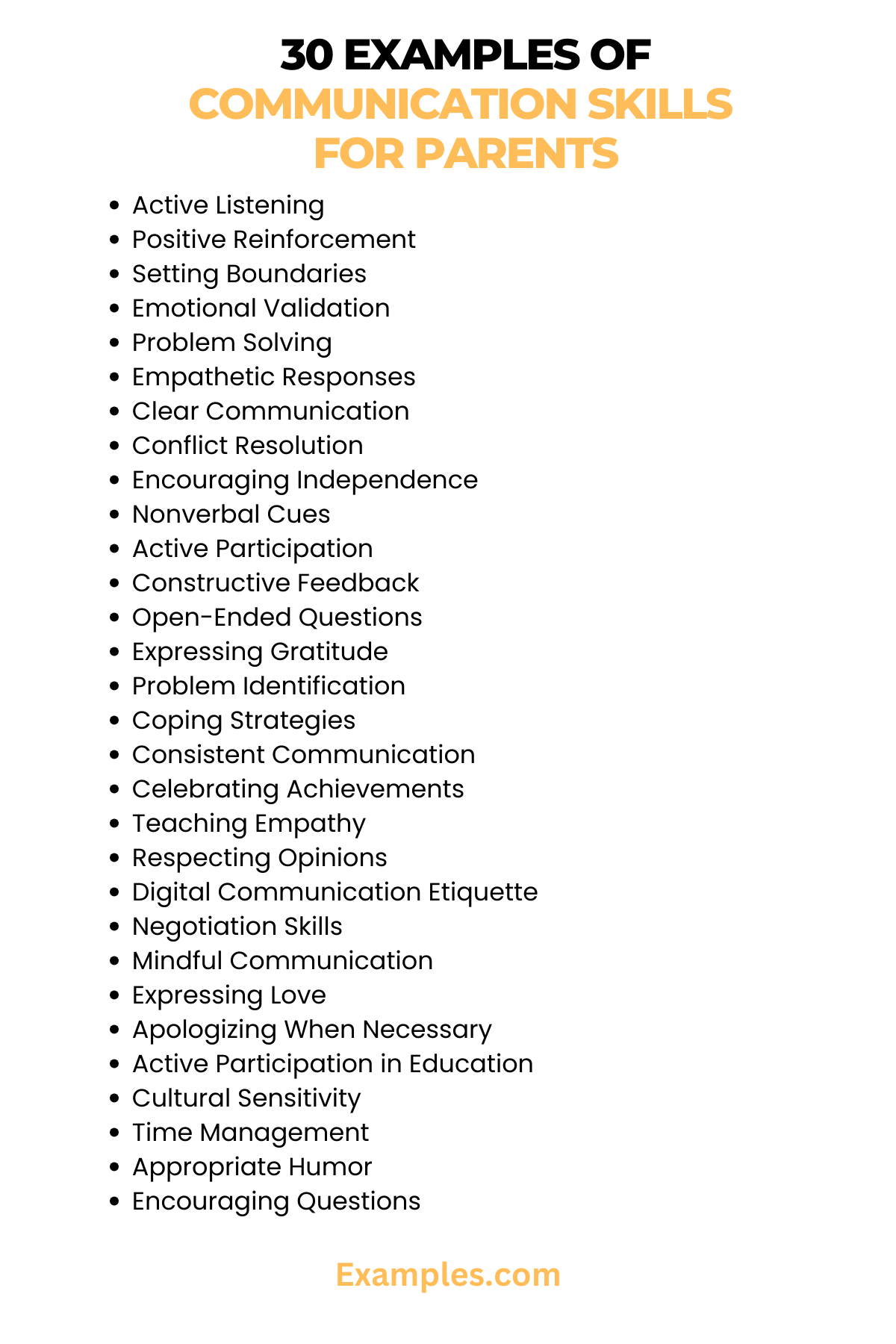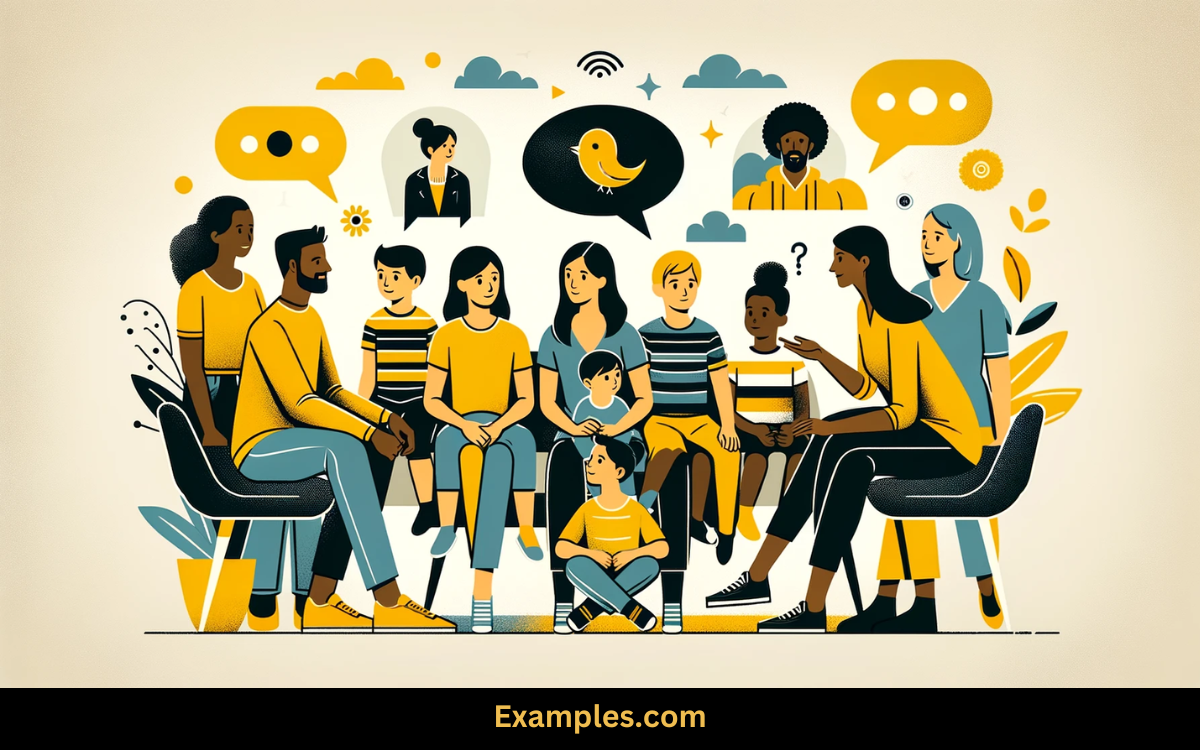29+ Communication Skills for Parents Examples
Unlock the art of effective parent-child communication with our comprehensive guide on Communication Skills for Parents. This detailed resource goes beyond theory, offering tangible examples that empower parents to navigate diverse scenarios. Dive into a wealth of insights, practical tips, and Communication Examples designed to enhance your interaction with your children. Whether in school, at home, or in social settings, this guide equips you with the tools needed to foster strong, meaningful connections with your kids.
30 Examples of Communication Skills For Parents
Enhance your parenting journey with our guide featuring 30 Communication Skills for Parents Examples. From fostering empathy to resolving conflicts, this resource provides practical insights for effective parent-child interactions. Elevate your communication game, strengthening connections with your children in various life scenarios.

- Active Listening:
- Boldly tune in to your child’s thoughts, showing genuine interest in their day.
- Positive Reinforcement:
- Encourage good behaviour with praise, reinforcing positive actions.
- Setting Boundaries:
- Clearly define limits, ensuring a structured and secure environment.
- Emotional Validation:
- Acknowledge your child’s feelings, validating their emotional experiences.
- Problem Solving:
- Guide them in finding solutions, nurturing critical thinking skills.
- Empathetic Responses:
- Connect emotionally, showing understanding in challenging situations.
- Clear Communication:
- Express thoughts and expectations clearly, avoiding confusion.
- Conflict Resolution:
- Teach peaceful resolution, turning conflicts into learning opportunities.
- Encouraging Independence:
- Foster autonomy by empowering your child to make age-appropriate decisions.
- Nonverbal Cues:
- Understand and use body language effectively in conversations.
- Active Participation:
- Engage actively in your child’s interests, strengthening the parent-child bond.
- Constructive Feedback:
- Offer feedback that guides growth, emphasizing improvement areas positively.
- Open-Ended Questions:
- Encourage dialogue with questions that invite detailed responses.
- Expressing Gratitude:
- Cultivate a positive atmosphere by expressing appreciation regularly.
- Problem Identification:
- Help your child recognize challenges, fostering problem-solving skills.
- Coping Strategies:
- Teach effective ways to handle stress and challenges.
- Consistent Communication:
- Establish a routine for regular, open conversations.
- Celebrating Achievements:
- Recognize and celebrate your child’s milestones and accomplishments.
- Teaching Empathy:
- Demonstrate empathy and compassion through your actions.
- Respecting Opinions:
- Encourage individuality by respecting your child’s opinions.
- Digital Communication Etiquette:
- Guide them on responsible and respectful online communication.
- Negotiation Skills:
- Teach the art of compromise and negotiation in family decisions.
- Mindful Communication:
- Promote awareness in communication, fostering meaningful connections.
- Expressing Love:
- Verbalize affection, reinforcing the emotional bond.
- Apologizing When Necessary:
- Model humility by apologizing when you make mistakes.
- Active Participation in Education:
- Engage with their academic journey, supporting learning and growth.
- Cultural Sensitivity:
- Promote understanding and respect for diverse cultural perspectives.
- Time Management:
- Teach the importance of balancing responsibilities and leisure time.
- Appropriate Humour:
- Use humour to connect, but ensure it’s appropriate for the situation.
- Encouraging Questions:
- Create an environment where your child feels comfortable asking questions.
Communication Skills for Parents Sentence
Unlock the power of effective parent-child dialogue with our diverse Communication Skills for Parents Sentence Examples. From active listening to conflict resolution, empower your parenting journey with practical sentences that foster understanding and connection.

- Modelling Active Listening:
- In hectic moments, showcase attentive listening by repeating back what your child says.
- Encouraging Independence:
- Empower your child with choices, saying, “Decide on your snack for today; I trust your decision.”
- Navigating Emotional Moments:
- During tantrums, calmly express, “I understand you’re upset. Let’s talk about it when you’re ready.”
- Setting Clear Expectations:
- Establish boundaries with clarity, saying, “Homework first, then screen time—let’s stick to our routine.”
- Conflict Resolution Dialogue:
- Guide resolution with, “Let’s hear each other out and find a solution we can both agree on.”
- Expressing Gratitude:
- Build positivity by saying, “Thank you for helping; your effort doesn’t go unnoticed.”
- Teaching Empathy:
- Encourage empathy with, “Imagine how they feel. How can we help them?”
- Navigating Academic Challenges:
- Support learning with, “Let’s work together to understand this topic. What challenges you?”
- Digital Communication Etiquette:
- Instil responsibility by saying, “Before sharing online, consider if it’s respectful and kind.”
- Celebrating Achievements:
- Celebrate success with, “I’m proud of your hard work. What achievement are you most proud of?
Communication Skills for Parents in School
Navigate the school environment with finesse using our guide on Communication Skills for Parents. From engaging with teachers to fostering academic curiosity, these skills empower parents to play an active role in their child’s educational journey.

- Teacher Collaboration Dialogue:
- Initiate communication with, “I’m excited to support my child’s learning. How can we work together?”
- Active Participation in School Events:
- Engage with, “I’d love to volunteer. How can I contribute to upcoming school activities?”
- Supporting Homework Efforts:
- Empower with, “Let’s create a quiet space for homework. How can I assist you with your assignments?”
- Effective Parent-Teacher Meetings:
- Maximize discussions with, “What specific areas can we focus on to support my child’s progress?”
- Navigating Academic Challenges:
- Initiate help with, “My child is struggling with a particular subject. Can we explore strategies together?”
- Addressing Behavioural Concerns:
- Collaborate on solutions with, “I’ve noticed behaviour changes. Can we discuss strategies for improvement?”
- Promoting Extracurricular Engagement:
- Encourage involvement with, “How can I support my child’s interests outside the classroom?”
- Fostering Peer Relationships:
- Discuss social dynamics with, “Any insights on how my child is interacting with classmates?”
- Timely Communication with Teachers:
- Stay connected with, “How can we ensure ongoing communication to address any concerns promptly?”
- Navigating Educational Transitions:
- Prepare for transitions with, “How can we smoothly navigate the shift to a new grade or school level?.
Communication Skills for Parents in the Workplace
Navigate the challenges of balancing work and family life with our guide on Communication Skills for Parents in the Workplace. From effective time management to fostering understanding, these skills empower parents to excel professionally while maintaining a strong connection with their children.

- Balancing Work and Family Dialogue:
- Initiate discussions with employers using, “I value family time. How can we create a schedule that accommodates both work and parenting?”
- Effective Time Management at Work:
- Request support with, “What strategies can help me manage work tasks efficiently, allowing for family priorities?”
- Open Communication with Colleagues:
- Build understanding with, “I value clear communication. How can we streamline information sharing within the team?”
- Navigating Parental Leave:
- Plan effectively with, “What steps can I take to ensure a smooth transition during my parental leave?”
- Flexible Work Arrangements Dialogue:
- Initiate flexibility discussions with, “How can we explore flexible work options without compromising productivity?”
- Professional Development Planning:
- Discuss growth opportunities with, “What professional development options align with my career goals and family commitments?”
- Handling Unexpected Family Situations:
- Establish protocols with, “How can I communicate unforeseen family situations without affecting work responsibilities?”
- Building a Supportive Network:
- Initiate support discussions with, “How can we foster a workplace culture that supports parents in their professional and family roles?”
- Stress Management Strategies:
- Discuss stress management with, “What resources or initiatives are available to support employees in managing stress and maintaining work-life balance?”
- Promoting Work-Life Integration:
- Initiate discussions on work-life integration with, “How can we create an environment that promotes a healthy balance between work and family life?”.
Why Do Parents Need Communication Skills?
Effective communication is not just a beneficial skill; it is a crucial asset for parents navigating the complexities of raising children. Here’s a detailed exploration of why parents need communication skills and how it significantly impacts various aspects of parenting:
- Building Strong Connections:
- Effective communication strengthens the emotional bond between parents and children, creating a foundation of trust and understanding.
- Navigating Challenges:
- Communication skills empower parents to navigate challenges and conflicts, fostering a cooperative and problem-solving approach within the family.
- Positive Influence on Behaviour:
- By effectively communicating expectations and values, parents can positively influence their children’s behaviour, promoting discipline and responsibility.
- Supporting Academic Success:
- Clear communication with teachers and involvement in a child’s education contribute to academic success by addressing challenges and fostering a positive learning environment.
- Promoting Emotional Well-being:
- Communication skills enable parents to recognize and address their child’s emotional needs, promoting a healthy and supportive emotional environment.
- Resolving Misunderstandings:
- Effective communication helps prevent and resolve misunderstandings, reducing the likelihood of conflicts and promoting harmony within the family.
- Encouraging Open Dialogue:
- Parents with strong communication skills create an environment where children feel comfortable expressing their thoughts, fostering open and honest dialogue.
- Preparing for Life Transitions:
- As children grow, effective communication helps parents guide them through various life transitions, from adolescence to adulthood.
- Fostering Independence:
- Communication skills empower parents to encourage independence in their children, allowing them to make informed decisions and develop a sense of responsibility.
- Creating a Supportive Family Culture:
- A family culture built on effective communication fosters a sense of support, unity, and resilience, preparing children to face challenges and succeed in life.
What is Effective Communication with Parents?
Effective communication with parents transcends mere verbal exchange; it’s a dynamic process encompassing various elements. Here’s a breakdown of key components that constitute effective communication within the parent-child relationship:
- Active Listening: Effective communication starts with attentive listening. Actively engage with your child, demonstrating that their thoughts and feelings matter. Avoid interrupting, providing them with a space to express themselves fully.
- Empathy and Emotional Validation: Understanding your child’s emotions and expressing empathy create a supportive environment. Acknowledge their feelings, reinforcing that their emotional experiences are valid and respected.
- Clear and Open Communication: Articulate your thoughts clearly, fostering an environment where openness is valued. Encourage your child to express themselves freely by creating a safe space for dialogue.
- Positive Reinforcement: Reinforce positive behaviours through praise and encouragement. This not only fosters a sense of achievement but also strengthens the parent-child bond.
- Problem-Solving Skills: Teach your child effective problem-solving techniques. Guide them through challenges, emphasizing collaborative and constructive approaches to finding solutions.
- Setting Boundaries: Establishing clear boundaries is crucial for a balanced parent-child relationship. Clearly communicate expectations and consequences, providing a structured and secure environment.
- Nonverbal Communication: Nonverbal cues, such as body language and facial expressions, play a significant role in communication. Be mindful of these signals, as they often convey emotions that words may not express.
- Encouraging Independence: Nurture independence by empowering your child to make age-appropriate decisions. This not only builds confidence but also promotes a sense of responsibility.
- Digital Communication Etiquette: In the digital age, guide your child on responsible and respectful online communication. Teach them the importance of digital etiquette and the impact of their words on virtual platforms.
- Consistent Communication: Establish a routine for regular communication. Consistency builds trust and ensures that your child feels comfortable sharing their thoughts and concerns.
In the intricate dance of parent-child relationships, mastering Communication Skills is paramount. This comprehensive guide explores the art of effective dialogue, offering a treasure trove of real-life Examples. From active listening to conflict resolution, empower your parenting journey. Embrace these insights to foster meaningful connections, creating a communication-rich environment that strengthens the parent-child bond.



